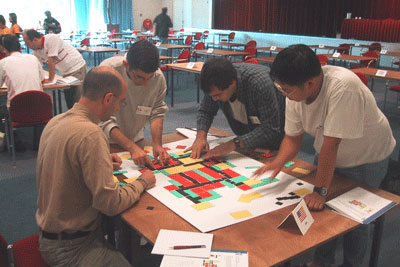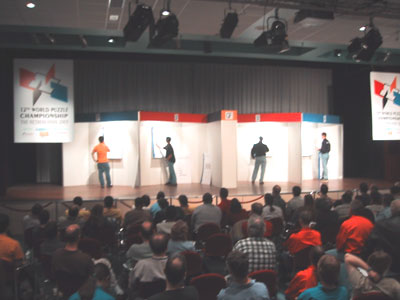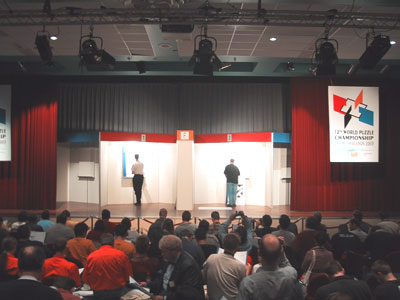|
|
||||||||||||||||||||||||||
|
||||||||||||||||||||||||||
|
Pieces of Papendal WPC-12 Photo Album
Pieces of Papendal The 2003 World Puzzle Championship was held in the Papendal Sports Complex in Arnhem, a town in the mid-east of the Netherlands. Nick Baxter, captain of the USA Puzzle Team and also organizer of the Google US Puzzle Championship, traveled with me to the event all the way from the San Francisco peninsula, solving practice puzzles all the way, such as the Dutch magazine Brein Brekers, published by Puzzelsport, the main sponsor of the event. As part of preparation for solving the sort of puzzles that were not going to be in the competition at all, I had solved the (cryptic) crossword in the Financial Times on the plane ride (my first ever cryptic solved without consulting external references! yay!). I would later check my answers with Will Shortz, whose name should require no further introduction to anyone reading this report. The day of arrival was calm and laid-back; a good time to meet old friends and new and get in a small game of "midget golf" (the Dutch name for miniature golf), especially since the course would be crowded with puzzlers three days from now. Another exciting part was meeting the two new US team members: Todd Geldon, a graduate student in mathematics at UT-Austin, and Michael Miller, a mechanical engineer from Pensacola, Florida. The fourth team member, Roger Barkan, didn't arrive until much later. I introduced a game I had purchased at the Frankfurt airport on the way -- "6 Nimmt" by Wolfgang Kramer. (It had been released as "Take 6" in the US about 10 years ago but had long since gone out of print.) In that we were also joined by Ulrich Voigt, the two-time world puzzle champion from Germany who apparently knows his share of German games as well. The next morning started off with a question-and-answer section on the instructions. This session ran shorter and cleaner than previous years, thanks to the foresight the organizers had of putting the puzzle instructions on the WWW one week before the event. This was soon followed by a photo shoot, where the entire American entourage looked quite smart in their first-ever official team jackets, donated generously by our sponsor, Google. This year's organization was much more spartan in its scheduled events; we would have one day to overcome our jet lag (not a problem for me and Nick, since we had arrived a few days earlier to attend the annual Dutch Cube Day) and we had a choice between three excursions; a shopping trip to downtown Arnhem, a trip to Burger's Zoo, or a trip to the Netherlands Open Air Museum, where everyone would also have dinner (including my first ever experience with Baked Alaska). Although this was in sharp contrast with previous years when it seemed like there were always too many excursions and not enough sleep, as it turns out we never found ourselves with lack of things to do. All of the Americans, with the exception of Roger the rebel, went shopping. No puzzle stores, but I found a few games to buy, including Villa Paletti, winner of the 2002 Game of the Year (Spiel des Jahres) award. Nick found a Dutch edition of 6 Nimmt, which apparently is called Take 5! in Dutch and is nominated for this year's Nederlandse Spellenprijs. (I'll let you solve the puzzle of why there's an apparent numerical discrepancy. But feel free to ask me for the answer.) Although I found a used bookstore, Will Shortz had already cleaned out most of the puzzle books of note, leaving only the dregs for me -- including a 1995 issue of Brein Brekers! Very interesting to open up the booklet and see how different the magazine looked then, with an editor's note written by Rob Geensen, now organizer of the WPC. (Those notes were actually ghostwritten by Peter Ritmeester, and would be later written under his own name. They're now written by Hans Eendebak.) Mealtimes were filled with lots of puzzle discussion at the tables. For instance, earlier Will had asked the whole WPC if anyone had any good international puzzles that he could use on his weekly segment on National Public Radio's Weekend Edition Sunday. He eventually decided on a nice puzzle for his October 19th show (I believe yours truly was mentioned on the show as well), which I won't reproduce here. One close contender was the riddle: "I have 11 brothers and sisters, 48 nieces and nephews, and 28 grandchildren. Who or what am I?" (I don't remember who came up with this puzzle -- apologies in advance for not crediting you here.) The next day the competition started. This year there was much more variety in the different scoring formats -- for instance, a 30-minute "sprint" round where only the number of puzzles you solve matters, not which ones; and a "relay" round where you need the solution to the previous puzzle to be able to solve the next one. After that first day, I was (perhaps irrationally) depressed; I had an unspectacular round 1, and had spent 25 precious minutes on a tedious 45-point puzzle in round 2, only to make a small mistake and gain no points. To top it off, I lost really badly at our yearly traditional game of Rifki to Husnu Sincar, the Turk who would later be elected to a position on the World Puzzle Federation Committee to take Erja Gullsten's vacated seat. As it turns out, I was too pessimistic. At that point, I was actually tied for fourth place with Niels Roest, the Dutch champion from last year, 5 points behind Roger, and a whopping 140 points behind Ulrich. The team standings were similar, with us in second place, behind the Germans by 176 points and barely staying ahead of the Dutch by 7 points. The second day's competition spread out the pack, with the timing of the rounds being more accurately paced with the top competitors. One of the exciting team rounds was entitled "The Weakest Link", where each of the four members of the team have to solve a puzzle individually to get one quarter of the final puzzle. This was a killer round, with only Belgium and the Netherlands managing to finish. By the time the dust had settled, the Germans were in a comfortable lead with 3807 points, the Dutch in second at 3699, and Team USA in third with 3611. With only one individual round in round 3 worth a maximum of 50 points (and that only to the fastest individual competitor), Ulrich had secured his first-place seed for the finals with 1150 points, while I had secured second with 1035 points -- Roger and Niels were tied at third with 935, their only danger being Michael Ley of Germany with 885. That night, Metin Orsel of Turkey invited Nick, me, and Derek Kisman of Canada for a rematch of a complex bidding version of Rifki that we had invented at the WPC in Oulu, Finland last year. Derek declined (he had been up at 3AM the day before for a TopCoder competition--go SnapDragon!), but Metin's teammate Umyt Abaciodlu filled out the fourth. A great game, but with only one play-test per year, it needs some work -- at 10 minutes per hand, a full game of 20 hands takes quite a while! The third and last day of the competition began. Roger pulled out the fastest finish, securing the 3rd place seed for him (and 4th place for Niels). But with Roger being the only American to finish, compared to two each from Germany and the Netherlands, we basically needed a perfect score on the last team round to gain second place, while the Dutch needed the same perfect score to gain first. Fortunately, we didn't know this and the Dutch did -- we went on to be the only team to solve the last round, an exciting cube-construction puzzle that is now sitting on my desk at work at the time I write this. But on to the individual playoffs, a single-elimination match up between the top eight competitors. Each match up would have the two competitors on stage solving three giant puzzles on poster board, with no time limit except the solving speed of one's opponent, and a very large audience watching to add to the excitement. (For instance, one of my friends, the talented puzzle designer Oskar van Deventer, had made a special visit to see the finals and was in the audience.) Once a contestant decided to submit their answers, both would stop solving, and the winner would be decided based on whether those submitted answers were correct or not -- the progress of the other person being completely irrelevant! As there was only room for four competitors at a time, Roger and I had to wait inside a shielded room with 6th seed Sebastien Leroy from Belgium and 7th seed Shinichi Aoki from Japan, while outside Ulrich faced-off against 8th place Zoltan Horvath from Hungary with Niels and Michael on the other side of the stage. Five minutes passed. Then ten. We were getting nervous; apparently the quarter-final puzzles weren't going to be easy! A big cheer of applause erupted from the other room; Ulrich had defeated Zoltan. But neither Niels nor Michael were close; we waited for what seemed like an interminable time (probably just another 10 minutes) before another wave of applause happened -- Niels, world champion from 2002, had been eliminated in the first low-seed upset! Then our competition started. We were a bit more prepared because we knew how much time the other four had took. I finished reasonably quickly (probably about the same amount of time that Ulrich took) and took the risk of checking my answers before submitting -- although if I had known how close Shinichi was at that point I probably wouldn't have! Roger took much longer to defeat Sebastien, but he did, ensuring that regardless of who won in the semifinals, the finals were going to be a German versus an American. The semifinals began. Although spectators later told me that I looked amazingly calm on stage, with my left hand in my pocket as I swaggered around, I have to declare now that my left hand was in my pocket to stop it from shaking from nervousness! But I managed to solve all three puzzles, and was debating on whether to check them when I heard a wave of applause behind me; Ulrich had declared. That clinched it; I decided not to check and to submit my answers as well. Thankfully, they were correct. It would now be me against Ulrich in the final, and to be honest I probably wouldn't be betting on me... The three puzzles in the finals were indeed harder than the quarterfinals or semifinals. Ulrich and I both polished one (star battle) off quickly, but then we were stuck on the other two. I shuffled my boards back and forth a lot, which (I found out later) really unnerved Ulrich because it sounded like I was making progress. But that was far from the case; one of the puzzles (a cross-sums) needed a key insight to make progress, and the other (an Easy as ABCD) needed either an extremely intricate deduction or a lucky guess to make work. I had neither; Ulrich managed to find both the insight and the luck, to take his (well-deserved) third crown as world puzzle champion. So the conclusion was that with the exception of Niels and Michael switching places, the top seed always beat out the lower seed. I wonder how they would've handled the final ranking if any of the other potential upsets had happened! The closing ceremonies were well-orchestrated but otherwise unremarkable and not unlike the other dinners we had, with some form of beef stew (Todd and Mike joked that all our dinners seemed to have beef stew in some form or another) and Dutch performers on stage singing American pop tunes from the last 50 years while us Americans ignored them and worked on puzzles. I was working on a rather elegant multi-layered puzzle designed by Roger (in previous years Roger, as a puzzle designer for things like the MIT Mystery Hunt, had brought WPC-style warm up puzzles, but this year all he had was a English-dependent one called "The Battle for Skyport") and eventually got it, with some help from the UK team. In the meantime, a big game of Rasende Roboter (Ricochet Robot in English) was going on in the back of the room. The trophy was beautiful and very puzzly -- a jigsaw puzzle of a globe, replete with continents and land features, cast in gorgeous metal that were held to a sphere through magnetism. Unfortunately, my second-place individual trophy had three missing pieces, inexplicably, and so I left it with Rob for replacement. I'm pretty sure I'll see it soon, though! As a nice parting gift, the organizers of the 2004 World Puzzle Championship in Croatia gave me a book filled with beautiful pictures of the Adriatic. Here's looking to next year, where maybe Zack (whom, I've been told, was missed both on the soccer field and off) can return to writing these trip reports! |
|
|||||||||||||||||||||||||
|
||||||||||||||||||||||||||
|
Copyright © 1999-2008 U.S. Puzzle Championship |
||||||||||||||||||||||||||








